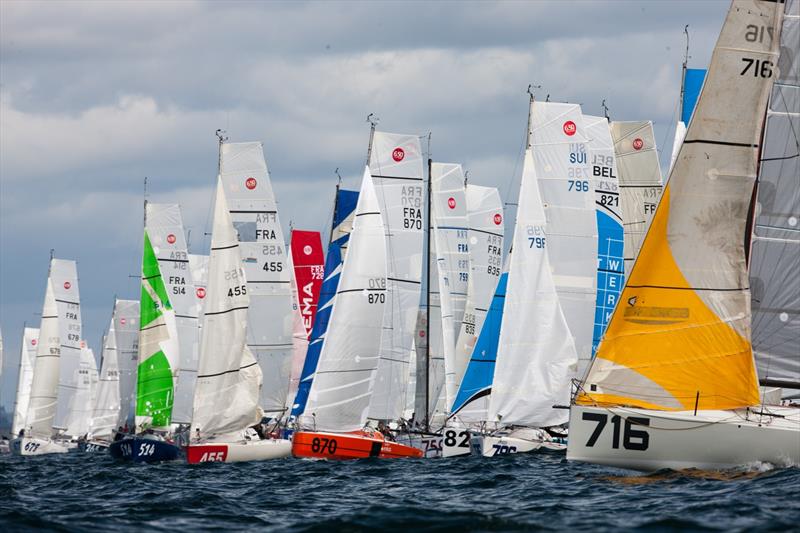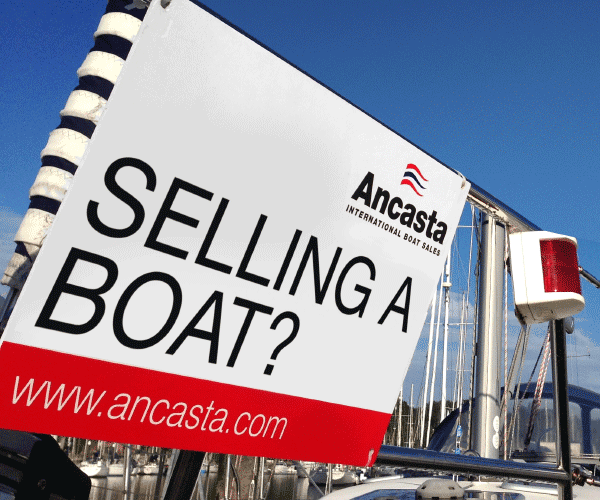
The Mini Transat 40 years old: a fine age
by Aurélie Bargat 22 Apr 2017 10:28 BST
22 April 2017

The Mini Transat © Christophe Beschi
Created to ensure sailors once again had a prominent place in a race ranking, the Mini Transat was devised by British sailor Bob Salmon and first set sail from Penzance in Cornwall some 40 years ago.
Twenty-seven sailors took part in the first edition, somewhat shrouded in secrecy. Since that time, the number of applicants has continued to grow and the race has gained in notoriety, yet the pioneering spirit remains.
In 1976, the world of offshore racing was in turmoil. The OSTAR, the famous singlehanded transatlantic race between Plymouth and Newport, had come very close to being won by Alain Colas on a giant 72-metre four-master equipped with a wealth of power-assisted devices. In response, the British decide to limit the maximum size of the boats to 60-feet (18m28). To counter this move, certain French sailors opt for the idea of launching the Route du Rhum in 1978, which continued to invite boats of unlimited sizes.
In light of this squabbling, Bob Salmon puts forward the idea of going back to one's roots: one man against the ocean. One thing was clear: the smaller the boat, the greater the sailor's input. As such, he decided that solely boats measuring a maximum length of 6.50m were be allowed to enter the race. The course was simple: a compulsory delivery trip from Penzance to the Canaries, then the actual race itself along the trade wind route to Antigua. A concept boasting surprising vitality was born.
A few key dates:
- 1977 – The first edition: it's Daniel Gilard who secures victory at the helm of Petit Dauphin, a Serpentaire. For this first edition, Bob Salmon, organiser and racer, finishes well after the first boats into the West Indies, who 'clock themselves out' on the finish line. Thereafter, the results of the first leg will count towards the final ranking.
- 1985 – Changing of the guard: after four editions, Bob Salmon passes on the role of event organiser. It's a French journalist who has fallen in love with the race, Jean-Luc Garnier, who takes up the event torch and sees legendary French sailor Yves Parlier secure the win that year. Brest then Concarneau will be the start venues for the 85 – 87 – 89 editions.
- 1991 – The technological revolution: this year, alongside the amateurs who flock to the start in Douarnenez, north-west France, Michel Desjoyeaux, who already boasts a sizeable track record in offshore racing by this point, lines up for the start aboard a prototype laden with innovations. A streamlined wing mast, a canting keel and an asymmetric spinnaker mounted on an adjustable bowsprit will soon be adopted by the Mini sailors before going on to become part of the rule on other series like the IMOCAs of the Vendée Globe. It's Damien Grimont who takes victory in the event.
- 1993 – The truncated race: during the negotiation of the Bay of Biscay, a deep depression scoops up the fleet and generates some particularly violent winds. The first leg goes on to be cancelled after the disappearance of Pascal Leys, one of the race favourites. Thierry Dubois takes the win in the second leg of the race.
- 1999 – A victim of its own success: for the first time, the Mini Transat has to refuse certain entries. Several competitors on the waiting list won't be able to take the start due to the lack of places. This particular year, the bad weather causes numerous retirements, prompting the Classe Mini to toughen up its qualification criteria.
- 2001 – Changing heading: it's a double revolution. For the first time since taking on a French lilt, the Mini Transat does not set sail from a Breton port, instead departing from La Rochelle. A new destination is also on offer to competitors, Salvador de Bahia in Brazil. For six editions, the race will stick to the same course.
- 2011 – The 'scow bow' changes the tone: naval architect and racer, David Raison dominates on his Magnum, a prototype with a radically different look. With her round bow, she is more powerful and faster than the classic prototypes. A revolution is underway.
- 2013 – Back to its roots: it's Douarnenez that assumes the organiser's mantle for the next two editions, along a course that harps back to the race's origins, since the final destination is that of the West Indies once again.
- 2017 – A story yet to be written: see you in the straits on 1 October for the start of the first leg between La Rochelle and Las Palmas (Gran Canaria). 84 solo sailors will be there to write a new page in the race's history.

